Paula Vince's Blog: The Vince Review, page 7
July 30, 2024
'Crooked House' by Agatha Christie
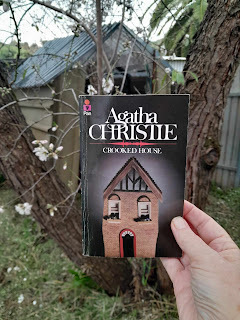
Described by the queen of mystery herself as one of her favorites of her published work, Crooked House is a classic Agatha Christie thriller revolving around a devastating family mystery.
The Leonides are one big happy family living in a sprawling, ramshackle mansion. That is until the head of the household, Aristide, is murdered with a fatal barbiturate injection.
MY THOUGHTS:
Thumbs up for this one.
Three generations of the Leonides clan live at Three Gables, a rambling, crooked old house. Aristide Leonides, the 88-year-old patriarch, dies suddenly. His killer has ruthlessly swapped insulin with the old man's own eserine eye-drops, which gets injected straight into his blood stream. Agatha Christie has stated poisons to be among her favourite murder weapons, and this callous case takes particular advantage of the victim's vulnerability.
Aristides' blood relatives comprise two sons and their wives, an elderly sister-in-law, and three grandchildren. They hope the culprit turns out to be Brenda, Aristides' much younger second wife, or Laurence Brown, the timid tutor of the two youngest family members. But they can't help fearing it might be one of themselves, although everyone supposedly loved the old man.
However, a bit of probing reveals that Aristide has annoyed or strained his relationships with several of them for various reasons.
The story is narrated by Charles Hayward, the son of Scotland Yard's Assistant Commissioner. Charles is engaged to Aristide's granddaughter Sophia, a pretty girl who refuses to marry him until the family mess gets sorted out. Hence, it's in Charles' best interests to tag along with the investigation team, although this sets him up for some awkwardness with his potential in-laws.
The unruly family begins to remind Charles strongly of the Crooked Man nursery rhyme, with old Aristide as the lead character. It occurs to him that some of them may be crooked not in a criminal sense, but because they are so tied up with each other that it's hard to untangle themselves as individuals.
I found myself disliking Aristide mainly because of one questionable decision he made regarding his will, which is bound to create intense family disunity after his death. I sympathize with a couple of family members specifically, for their heated reactions when they discover how their elderly relative left his money.
The revelation of the murderer is a bit of a shocker, and I can imagine Dame Agatha smirking. She provides fairly decent clues that she counts on readers overlooking. My feelings toward the eventual denouement include horror, especially that one other character would take it upon themselves to play God, so to speak.
The book was published in 1949, during that post-war, mid-20th century era when everyone seemed to smoke like chimneys. As a true sign of the times, Charles notices the peculiar absence of a familiar smell when he's ushered into Sophia's dad's library. It strikes him that the missing element is tobacco, for Philip Leonides is one of those 'rare beings', a non-smoker. Thankfully times have changed and he's now among the majority of people I know.
I like this story. The characters are strong and vital, and I find myself wondering what the future will hold for some of them, who I can't mention by name and thereby indicate their innocence. My temptation to flirt with spoilers must signify the compelling quality of this story. It is up among my favourites so far.
🌟🌟🌟🌟
July 23, 2024
'Ishmael and the Hoops of Steel' by Michael Gerard Bauer
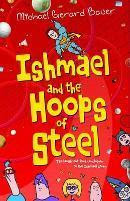
Ishmael has made it to the Senior School and things are really looking up. His nemesis and chief tormentor Barry Bagsley has finally decided to leave him alone, while his dream girl and chief goddess Kelly Faulkner has finally decided not to. Has he broken free of Ishmael Leseur's Syndrome at last? Could his remaining two years at St Daniel's College actually be described as 'normal'? Absolutely not. Ishmael's mates critique the Ishmael books: Ignatius Prindabel: I found 37 factual errors. Scobie: Harry Potter for those with an IQ higher than the mean. Bill Kingsley: Funnier than the Arcturian Grendel-Worm. Razzman: Short on chicks, that's all I'm saying.
(Haha, this is one of the more entertaining official blurbs I've read. Got to love the boys' critique of this series which they feature in.)
MY THOUGHTS:
This is the final installment of the funny but perceptive high school trilogy that begins with Don't Call Me Ishmael. There was a copy of this last novel available as an e-book from the library, so I borrowed it.
It takes Ishmael and his four best friends through Years 11 and 12 at St. Daniel's. They study Hamlet in Mr Slattery's English class and actually take on board some life lessons from the Elizabethan era; every teacher's dream.
I'm assuming that anyone reading this review will be familiar with the characters of the five boys from the first two novels.
James Scobie pushes his boundaries to consider attempting a bit of sport, Bill Kingsley comes out of the closet (not a spoiler since he makes his big reveal early on in the book), and Ignatius Prindabel quietly amazes the others by becoming a drawcard for nerdy science chicks. Orazio Zorzotto seriously considers boosting his grades, if it may lead to being a P.E. teacher some day. As for Ishmael, he initially loses Kelly Faulkner when she relocates to New Zealand with her family. Yet when she returns, suffering depression, he makes it his personal goal to turn the light back on in those ice-blue eyes.
The novel's title is truly inspired. The 'hoops' aren't referring to the fact that Bill Kingsley has made himself trim and buff by spinning hula hoops. It's partially drawn from Hamlet, when Polonius tells his son, Laertes, 'Those friends thou hast and their adoption tried, grapple them unto thy soul with hoops of steel.' The boys interpret it to mean, 'Hold your true friends tight with the strongest bonds you can find.'
Given all the merciless happenings that take place at school, they truly need each other, even Razz and Prindabel. At one point, Razz tells Bill, 'If you're crossing the stream, don't disturb the piranhas.' I appreciate how Bauer, who has worked in the education system, appreciates what a minefield it can be. In all honesty, I've never had as rough a life since I left High School.
Finally, the boys draw upon their 'hoops of steel' bond in a most creative manner.
The best aspect of this book is the empowering, underlying motivation to set our sights on worthy goals, refusing to let the apparent impossibility of achieving them intimidate us. Our quintet set their sights on winning their House Cup for Miss Tarango, giving it their all. Their eagerness helps them to invent and maximise opportunity rather than focusing on brick walls. They become creative, possibility thinkers, each drawing from their own unique strengths for the sake of the whole. Orazio describes his theory of how 'reverse cool' can become cool again, and it almost makes sense with these boys and their teamwork.
Now, is there a drawback of this book? Hmm, I never thought I'd say this of a storybook bully, but there's not enough Barry Bagsley. In fact, although he's sometimes referred to in passing, Big Bad Bazz doesn't show his face within these pages even one single time. Now, that's unrealistic.
Sure, he made a pact with Ishmael under heated circumstances toward the end of Return of the Dugongs, yet I can't believe he'd gracefully slip out of the picture entirely. It suggests that Michael Gerard Bauer simply had no spot for Barry in this plot. That's fair enough, but perhaps he should have taken Barry right out of the picture with a cross country move or change of school.
At least Barry's dropkick friend, Danny Wallace, gives Ishmael a couple of straight vodkas at a formal in another eventful incident. Boys will be boys.
It made me laugh several times, and I do regret parting with these boys. I quite understand how Miss Tarango would consider these five her favourites.
🌟🌟🌟🌟½
July 16, 2024
Michael Gerard Bauer's 'Don't Call Me Ishmael' trilogy
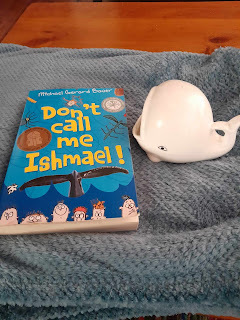
Don't Call me Ishmael
My husband is a High School relief teacher, and one day he found himself in an English class which was studying this YA novel that features Year nine students in an all-boys school. It sounded like a fun read, so when I spotted a copy at a coastal secondhand bookshop, I bought it.
The beginning is the biggest hurdle, as our main character, Ishmael Leseur, starts off rambling. Chapter two purports to tell us how he was named after the narrator of Herman Melville's Moby Dick (a book I also found far too long-winded), yet not until chapter three does he actually tell it. I was wondering whether being a tedious narrator simply goes along with the name Ishmael, when luckily the story started growing on me. Whew!
Ishmael has a fertile and perceptive thought life, but falls short when it comes to talking to people on the spot. He's the king of awkwardness, mind blanks and sticking his foot in his mouth. Bizarre and embarrassing things usually happen to him around his crush, Kelly Faulkner. What's more, he's a prime target of the class bully, Barry Bagsley, a nasty piece of work who relishes his hobby of making others miserable.
Ishmael's coping tool when it comes to Barry and his gang is to make himself as inconspicuous as possible in an effort to slide beneath their radar. When a vulnerable looking new kid, James Scobie, joins the class, the newcomer's future looks grim. Incredibly, James has ways of holding his own against Barry, which Ishmael benefits from. The downside is that Ishmael's new friend James expects him to join their Year 9 debating team, which gives Ishmael extreme stress just thinking about it.
I appreciate the fact that Barry is shown as being a jerk simply because it gives him a buzz. As a bullied kid myself at school, I'd grow weary of hearing justifications for their behaviour from teachers, such as, 'Hurt people hurt people.' Apart from resenting that we victims sometimes received less support than our antagonists, it so often didn't hold true. I knew plenty of kids from loving, nurturing backgrounds who still relished bullying just for the thrill of it. Barry seems to be one of these, and good on Bauer for not glossing over it.
(Update: having read book 2, a fact about Barry's backstory has come to light which some readers will surely say justifies his tendency to lash out at others. But since we don't know about it all through book 1, I'll let my point stand.)
The overdrawn imagery all through this book amazed me at first. Every page is crammed with vividly-descriptive similes and metaphors. I clearly remember, as a new writer, being corrected by an editor for doing the exact same thing. She crossed them out and told me to stop. ('It draws attention away from the flow of the story itself.') This explanation made sense, so I quickly toned them down.
Considering I took pains to train myself out of the habit, to see Bauer doing it continuously irritated me at first. But then I realized that Bauer has given Ishmael this style for a good reason. It's Ishmael's hallmark, and making these bizarre analogies is how he rolls. I enjoyed it when I got used to it.
Just goes to show, even techniques that are generally frowned upon by professionals in the industry can become strengths when used consistently and fearlessly.
The story clearly succeeds overall, because even though I shook my head reading it so many times, I straight away got hold of the second and third books in the series from the library.
Characterisation and dialogue win the day. It's not often that I actually laugh out loud while reading. I've referred to certain books passing my 'tears test' in previous reviews. I'd better add a 'laughter test' now. The fact that I did laugh pushes this one from three stars to four.
🌟🌟🌟🌟
Ishmael and the Return of the Dugongs
Apart from his desire to get a whole lot closer to Kelly Faulkner with the wonderful, ice-blue eyes, Ishmael continues to hold his end up for their debating team. He (ineffectively) attempts to make peace when his friends, Razza and Prindabel keep clashing, and (more effectively) tries to help his dad's middle-aged band members put together a 20-year reunion concert.
Strokes of cringeworthy bad luck continue to dog his footsteps. It seems some sort of magnetism is involved. Why do tongue-tied, awkward folk like Ishmael (and me, I admit it), tend to attract more than our fair share of face-palmy predicaments?
One big question for readers to figure for ourselves is whether Kelly is attracted to Ishmael or not? We only ever see her through his viewpoint, which remains ambiguous, even when he tries to sneak a read of her diary to find out for sure. The subject could constitute a debate among readers itself.
Characterisation and dialogue continue to carry the day. People like Ishmael (and me) will continue to envy people like his best mate Razza, who are quick-witted enough to think on their feet and never seem to realize what a fortunate skill that is. The nerds win our affection too. It's good to see James Scobie back as his super-capable self, and I can't help wondering what science geek, Ignatius Prindabel will pull out of his hat in the third installment.
I went away for a quiet weekend and this was a perfect short holiday read. You don't have to concentrate too hard to get a pretty decent story, there are several laugh-out-loud moments, and enough impetus for me to decide, 'Okay, aother chapter.' What will these five boys deliver next?
🌟🌟🌟🌟
Note: I have also read the third installment of this trilogy, Ishmael and the Hoops of Steel. I will review that one separately.
July 10, 2024
'Henrietta's House' by Elizabeth Goudge
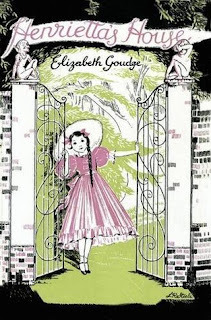
Back to beloved cathedral town of Torminster in the early years of this century.
One golden afternoon, Henrietta Ferranti, along with her family and friends, sets out for young Hugh Anthony's birthday party, and he's going to celebrate with the people he loves best, young and old alike. The day begins with a wish and ends with a revelation after a magical mystery tour. A procession of landaus and victorias, plus one motor car, are bound for the Blue Hills and Hugh's picnic. Whatever the reason, each of the horses and ponies carrying them mysteriously lost on its way to the Blue Hills.
As each of the partygoers ventures into an enchanted forest where legend becomes reality and their wildest dreams come true, and by the time the travelers meet again over tea and iced birthday cake, they have had such adventures. Adventures such that none of them is the same person. They are wiser, nicer and much happier. The innocent birthday picnic becomes the adventure of a lifetime and no one will ever be the same again.
MY THOUGHTS:
After reading the first in the Torminster series, A City of Bells, I wanted to get hold of this sequel. Sourcing it turned out to be easier than I expected. There was a free Internet Archive copy which I borrowed a couple of times.
Henrietta's House re-introduces several main characters from A City of Bells in this yarn that's saturated with magical realism, then blended with High Church cathedral lore, and a pinch of pagan mysticism in a true Goudgian cocktail.
Young Hugh Anthony has requested an excursion to Foxglove Combe for a picnic on his birthday. So several archaic, mostly horse-drawn vehicles trundle off from Torminster, and most of them are eerily seduced off course to a strange gatehouse where there are statues of a cowardly, craven child and a mocking imp. (We learn that they represent the cringing human soul in the face of the mockery of Providence.)
From there, several separate adventures await each carriage load.
Twelve-year-old Hugh Anthony and the pompous old Dean are an unlikely pair, united by their mutual satisfaction at belonging to the Ruling Class and Dominant Sex. These two suffer a few scary come-downs in a network of underground caves.
Meanwhile, Henrietta and eccentric old Mrs Jameson stumble upon Henrietta's dream house, furnished exactly as she imagined it. Henrietta's plot thread includes her fondness of the domestic lifestyle, pairing magic together with housework in her eyes. There turns out to be a natural explanation for the existence of Henrietta's dream abode, but it still has a hint of the paranormal.
Grandfather and Bates befriend a bitter old man at the weird gatehouse who indulges in the black arts, making voodoo dolls which he pricks with pins.
Amusingly, only Grandmother's party avoids being magically misdirected, because she's so chock full of common-sense and bossiness, no supernatural sleight of hand could possibly get the better of her.
Jocelyn and Felicity come to grief in their spiffy new motor car. It's state of the art for them, but strikes the modern reader as an antique rattletrap. They crank it up at the front to start, and even wear full motor outfits similar to Toad's in The Wind in the Willows. And when Jocelyn steers it through the main street, he's terrified of running somebody over. Since drivers' licences were a thing of the future, it was a valid fear. Of course while Jocelyn and Felicity show off their pride and joy, the oldies deplore the noise, smell and speed. Grandfather hates to offend the young couple but secretly laments that peace and quiet will soon be a thing of the past.
It's worth noting that even though they are now married, Felicity still works as a stage performer in the city. That's commendably liberal for the early twentieth century, but I guess she's the major bread-winner. It seems Jocelyn's bookshop is still more of a passion project, so perhaps sadly times haven't changed much in some ways. He's said to have a wise and owlish look as a result of reading his merchandise all day. Hopefully the same thing applies to today's book bloggers.
This is a strangely compelling read, like many of Goudge's stories.
It's also worth mentioning Henrietta's Top Twenty books she'd recommend for fellow kids. I'm always up for ticking off yet another new reading list. Some of these I'd never heard of, but they were evidently popular in their era.
1) The Water Babies
3) Undine
5) Jackanapes
6) Little Women
7) The Fairchild Family
8) A Flat Iron for a Farthing
9) The Back of the North Wind
10) The Princess and the Curdie
11) Uncle Remus
12) Hans Andersen's Fairy Tales
13) The Swiss Family Robinson
14) Andrew Lang's Blue Fairy Book
15) Andrew Lang's Red Fairy Book
16) Andrew Lang's Green Fairy Book
17) Mary's Meadow
18) Lob-Lie-By-The-Fire
19) Treasure Island
20) The Cocky-Olly Bird
🌟🌟🌟🌟½
July 2, 2024
'Pollyanna of Magic Valley' by Virginia May Moffitt
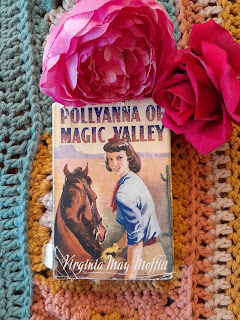
MY THOUGHTS:
We have a new author picking up the slack with this twelfth Glad Book. Virginia May Moffitt does a nice job of weaving in threads left dangling by other authors, most recently Margaret Piper Chalmers.
This is a post-WW2 tale, and all the male family members have survived combat, which we'd surely hope, being a Glad book. Pollyanna and her daughter, Ruth, are heading to Palm City, Rio Grande Valley, Texas, where they plan to join newlyweds, Jim Junior and Rosemary. Jimmy Senior, aka the Chief, is already there with the young couple. Many of their close neighbours are Latin American, and the story highlights plenty of inter-racial prejudice.
Jim Junior has picked up a very cool contract taking promo photos of the region. He's lucky to land a plum job in line with his passion. The problem is that rental properties are as scarce as hen's teeth. The Pendletons manage to make a contract with Nelson Kipps, a chilly and brusque old man who owns a derelict property where his heart was once broken. The catch is, it's rumoured to be haunted. Strange lights bob up and down behind shaded windows at night. And when our family of five move in, bumps and thumps are added to the mix.
Once again, the Pendleton family's total scepticism of the supernatural surprises me. They dismiss any possibility of spiritual or ghostly input as impossible. If any occurrence falls outside the limited evidence of their five senses... well, they refuse to let it fall outside. They have to jam it into their explainable worldview somehow, and the author, Moffitt, gives the Pendleton family the logical explanation they demand.
I tend to keep a far more open mind than these characters, and give the supernatural realm the respect it deserves. There is surely far more depth to the goings on in our vast cosmos than meets the eye.
One thing is certain. If I'd seen eerie lights inside a supposedly empty old house with a spooky reputation, I would have abandoned all ideas of wanting to rent it. Surely that's not just me being chicken hearted.
I think the Pendletons have idealized expectations about the rental market too. They consider Mr Kipps to be mean and churlish when he agrees to rent his old house to them with stipulations. He insists on locking some expensive antique furniture items up in the attic and denying them access. Come on Pendletons, I did the rental shuffle-around for years, and this is all part and parcel of the lifestyle. If they consider Mr Kipps to be ungenerous then so are many landlords and landladies I've rented from. In fact, I have far worse stories. You gotta just suck it up. People tend to be very precious with their own property.
Although Pollyanna's name is on the cover, our touchstone character is often eighteen-year-old Ruth, who is a refreshing heroine. She combines Pollyanna's sunny friendliness with Jimmy's frank practicality. I think her tendency to flare up with righteous temper is also from her dad, and her brother shares the same trait. Throughout the series, Ruth has been used to being overshadowed by her prettier sister, Judy, and now it's her gorgeous sister-in-law, Rosemary. Nothing has really changed, but she never lets comparisons with these more conventional beauties get her down.
BTW, Judy and her husband, Ron, live far away, but the others miss her badly and write lots of letters.
Several other teenagers feature in this story, including Mr Kipps' musical granddaughter, Barbara, whose life Ruth saves on the very first page of this book. There is also a proud girl named Susan who has a knack for interior design, and several boys who Moffitt presumably added to appeal to her female teenage market, but these fellows tend to blur into one.
Interesting details include severe blows to the citrus industry when the mercury plummets down below zero. The Aussie orange crops I'm used to never contend with such severe cold snaps. And the family owns a Morris chair, which is a type of recliner invented by William Morris, the textile and wallpaper legend. When I googled them they looked familiar, but I had no idea that's what they're called.
Hey, anyone who's into fashion parades may enjoy one particular thread with dresses made out of fruit and vegetables.
Moffitt, for the most part, uses her setting to complement her plot, rather than dumping huge gluts of description just for the sake of it, ȧ la Elizabeth Borton. I find the amazing HEAs a bit too pat and forced, and the eventual solution of the mystery turns out to be far more weird and unlikely than plain old ghosts, in my opinion. I still quite enjoyed this story. After all, we have Pollyanna and Jimmy in their early fifties, sharing a haunted house with their adult kids! That premise alone hooked me from the start. What would Eleanor H. Porter have thought if she imagined where other authors would take her little glad girl?
🌟🌟🌟½
I'm nervous to see Elizabeth Borton's name back on the next book, Pollyanna and the Secret Mission. Having passed on the baton, she now picks it back up again. Come on lady, you wanted out! Oh well, I'll soon see what it's like.
June 25, 2024
Mid Year News

I started 2024 off with some plans for the year. Now that we are at the tail end of June, here is a bit of an update. The weeks have flown, but they haven't been uneventful.
1) My Diploma and Trophy
In early April we graduated. It's great to tick off study milestones. I received my Graduate Diploma of Creative Writing and Communication, while my husband, Andrew, received his Master of Teaching. As a total surprise, I was presented with one of the special academic awards of the ceremony. It boosted my confidence in ways I can't describe. Since my undergraduate days, so long ago now, I never considered myself much good at formal study. The rigors of that course had knocked my teenage bravado right out of me. I purposely planned this blog to be all about discussing classic and bestselling literature in a down-to-earth, no-frills style.
(Check out this other blog post I wrote, A blog for normies.)
But perhaps I'm not a complete academic slouch after all. I'm taking this lovely trophy as a serendipitous wink to keep on writing. Not surprisingly, however, the assignments that involved storytelling suited me for better than anything requiring referencing and lots of research.
I'm glad I followed through with my studies at Tabor College. You never know what you're capable of if you don't give a try, and in all honesty, part of my impetus was need. When I'd finished homeschooling my kids, I had to find something to do to help keep a bit of an income rolling in.

2) My Fan Fiction
I've been keeping a lid on this one all year, but can't help letting out a little bit of excitement. After a hiatus from fiction writing of almost a decade, I've caught the bug again. I've been working hard since February on something totally different from anything I've written before, and to mark the change, I've used a pseudonym.
When I stumbled across the awesome, extensive Archive of Our Own fan fiction site (or AO3) I instantly decided to add writing a fan fiction to my bucket list. Daydreaming further details of other authors' brilliant characters long after I've finished their books has always been second nature to me. So I chose my fictional universe (Louisa May Alcott's Little Women - Jo's Boys series), came up with my main characters (a couple of her 'boys') and started scribbling away. And the project has really ignited my imagination and taken off!
What's more, I learned an important fact about myself in the process. Writing fiction energises me more than writing non-fiction. During my Diploma, I imagined trying my hand at a non-fiction book. I had good intentions to try adding to the glut of happiness literature with a book entitled, 'Happiness Tips from Fictional Characters.' I meant to draw examples from many of the reviews I've written for this blog. I'd even completed a major assignment about how I envisaged the layout, with a few sample examples. Yet in all honesty, it always felt like a bit of grind when it came to actually working on it.
Once I started my new fan fiction though, my drive was instantaneous. My imagination kept drifting back to it. The contrast was so dramatic, I've accepted once for all time that working on non-fiction will never excite me in the same way as writing stories.
I still enjoy reading non-fiction though. It's just that now I have even more respect for non-fiction authors than ever before, because they manage to see ideas through to book form, which I could never bother forcing myself to do.
Hey, if somebody else writes a book of happiness tips from fictional characters, I'll read it.
3) Social Media
I've been having a bit of a time crisis with the juggling act between my couple of platforms. The vastness of 'bookstagram' has been swamping me most of all. I appreciate the wise souls who have pointed out that the human spirit isn't equipped to cope with the beast we've created. Human beings existed for centuries with social outlets of just twenty to fifty friends and acquaintances. And their places of influence spanned a few miles around their physical dwellings, at least most of the time. Now we've suddenly had our reach exploding! The invention of the internet means we may now consider an unlimited crowd from right around the globe to be personal friends of ours. And they're all potentially available the very second we share something. While our egos may cry out, 'Hell, yeah!' our finite cellular make-up crumbles under the pressure. I'm sure I'm not alone.
Misplaced guilt has been dogging me. Many online friends I follow publish a steady stream of beautiful, painstaking, well-curated posts. Giving them each the appreciation they deserve would require hours of attention and concentration, rather than the half-hour or so I put aside for scrolling through Instagram and Facebook. Responding as I'd like to would take me at least half a day, so since I'm just one individual with a limited time frame, I often find myself skimming or scrolling past instead. That's the source of my misplaced guilt. I can't help feeling callous, even though logic tells me keeping on top of it all is an impossible dream. In Johann Hari's book, Stolen Focus, he uses the analogy of trying to drink water from a fire hose. We simply can't keep up.
When we try, with the best of intentions, our attention spans are frizzled. I won't go there now though. That's a subject for another day, and more thorough thinkers than I am have tackled it.
I've slowed down my own Instagram output without sputtering out completely, although to be completely honest, I've sometimes considered pulling the plug. I'm not really sure what to do about the time-sucking nature of this problem, either spreading us way too thin or loading shovels of guilt on our frail psyches for not keeping up with the stream of feed.
How do you handle it?
4) For now anyway...
I'm keeping up with this blog. I consider myself to be providing a low-key but vital service by adding impressions and personal details about books people may want other opinions about. Quite often, a post will receive comments years after I've written it, from readers who are just now enjoying the books I've discussed.
And of course my fan fiction (it's called 'Longing For Home') is never far from the top of my mind. Many chapters are now up on AO3, but as I'm not finished yet, I'll keep quiet again until later. I'll just say that I wouldn't mind letting you in on the secret if you twist my arm.
Perhaps now that I've let the cat out of the bag, I'll follow up with more posts about my fan fiction writing process in the future.
It's been refreshing to step back from the type of personal marketing that used to cause me a fair amount of stress. Rather than trying to sell myself, I'll merely ask you if you'd fancy an immersive story about one of Jo March's nephews, along with one of Laurie's proteges?
If so, 'Longing for Home' may be just what you're looking for.
June 19, 2024
'Treasure Island' by Robert Louis Stevenson
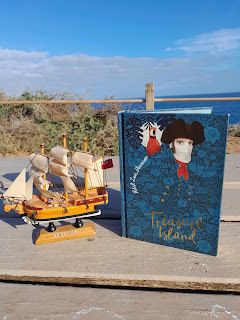
Designed to forever kindle a dream of high romance and distant horizons, Treasure Island is, in the words of G. K. Chesterton, 'the realization of an ideal, that which is promised in its provocative and beckoning map; a vision not only of white skeletons but also green palm trees and sapphire seas.' G. S. Fraser terms it 'an utterly original book' and goes on to write: 'There will always be a place for stories like Treasure Island that can keep boys and old men happy.'
MY THOUGHTS:
I never considered myself among the target audience for this classic. Perhaps that's why I've only now got around to reading the Victorian boys' adventure story, because it was part of a beautiful set of William Morris inspired kids' classics I came across.
Jim Hawkins' father is the inn-keeper of the Admiral Benbow, a small coastal hotel. One day a scruffy old sailor shows up, and gatecrashes for weeks, deterring more refined clientele. He finally dies after guzzling too much rum, leaving behind a battered wooden chest. Inside, young Jim finds a bundle of papers wrapped in oil cloth, including a map of a mysterious island with buried treasure clearly marked.
Mr Trelawney, the talkative local squire, along with the more circumspect Dr Livesey, decide to hire a ship and follow the directions with Jim as cabin boy. Trelawney reveals too much about their top secret mission while hiring a crew for the Hispaniola. A sweet talking, one-legged man named Long John Silver begs for a job as cook, and offers to recommend several other willing crewmen. Sounds legit, hey?
Not until they're long underway does young Jim accidentally overhear a frightening plot. Turns out he and his mentors have unintentionally surrounded themselves with a ruthless gang of cutthroat pirates. They must begin a dicey game to fake oblivion among these desperadoes who are also playing their own role of innocent sailors. And the good guys know full well time is of the essence. They must figure out what to do quick smart.
This action adventure yarn probably took off from the outset because Stevenson created an easy hero for his target audience to get behind. Jim Hawkins is supposedly just a normal kid, yet when the crunch comes, he keeps surprising himself with his own amazing strokes of luck and quick-thinking way out of jams. His terrifying predicaments always turn out to be the exact right place and time for life-saving exploits. Stevenson's original boy readers might've liked to imagine they possessed similar reserves of dormant heroism.
(Okay, hold tight for a bit of a rant. I've come across many reviewers who criticise modern kids' novels because the main characters are willful and flout authority at every turn. 'Harry had no business to disobey rules and wander around the halls of Hogwarts at night; it gives such wrong messages to kids, yada, yada.' Well, believe me, no young fictional hero could possibly top Jim Hawkins for brazen disobedience and going off on his own merry way, ignoring masters and mentors. And this is a beloved classic from the Victorian era, when children were generally well-behaved. I guess my point is that compliant youngsters who always do as they're told don't always find themselves in riveting story situations. We need to cut modern authors some slack.)
Also quite fascinating is the mutual admiration between young Jim and Long John Silver. These main characters stand for opposing values, yet their behaviour styles are similar. Silver is a charismatic chameleon who makes accurate split-second decisions on the spot, which keeps him from the noose. I suspect the psychological reason young boys enjoy playing pirates, or reading about them, is to flirt with their own shadow selves in a socially acceptable way. If so, then Stevenson really provides for this manner of indulging their intrigue for darkness, while remaining squeaky clean themselves.
I can't figure out whether my 4-star ranking is for the quality of Stevenson's story or because of how popular culture has jumped onto the fruit of his imagination. He's done for piracy what Dickens did for Christmas. It's all so colourful and reckless. Whether it's Long John Silver bellowing, 'Shiver me timbers,' or Captain Flint, the parrot, squawking, 'Pieces of Eight,' it's become the stuff of legend. Piracy clearly isn't just a job, it's a lifestyle.
Still, I find it interesting how these Victorian pirates feel uneasily tied in their minds. (They're technically Georgian, since Stevenson set it a century before he wrote it.) Even though they've relinquished their souls to booze and vice, an uneasy Christian worldview hovers over their heads, filling them with dread for the afterlife. I suspect that if the likes of Dick Johnson and Israel Hands existed today, their consciences would have a far easier time, yet on the other hand, 21st century outlaws have surely lost a lot of their romantic mystique. Hopefully young Dick, at least, wouldn't find it so easy to be lured to the dark side, so to speak.
I learned some interesting facts while reading Treasure Island. There is the barbaric practice of 'keel hauling' in which miscreants are roped up and dragged beneath the ship's keel, having their flesh maimed by barnacles and other sharp marine life. And the meaning behind the jolly roger flag, which stems from the French 'joli rouge' meaning 'pretty red' with its bloodthirsty connotations.
Of course, running through the whole story is, 'Fifteen men on a dead man's chest, yo ho ho and a bottle of rum.' Sort of corny really, but it's unapologetically over-the-top and fun.
I doubt I'll ever be tempted to re-read it, but 4 stars anyway.
🌟🌟🌟🌟
June 11, 2024
'Five Little Pigs' by Agatha Christie
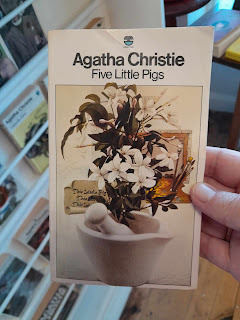
It was an open and shut case. All the evidence said Caroline Crale poisoned her philandering husband, a brilliant painter. She was quickly and easily convicted and sentenced to life in prison.
Now, sixteen years later, in a posthumous letter, Mrs. Crale has assured her grown daughter that she was innocent. But instead of setting the young woman's mind at ease, the letter only raises disquieting questions. Did Caroline indeed write the truth? And if she didn't kill her husband, who did?
MY THOUGHTS:
The earnest young woman says, 'I've got to have the best,' to which the private detective replies, 'Rest assured, I am the best.' This is one of my favourite Hercule Poirot mysteries so far.
Amyas Crale, the brilliant artist, was murdered by poison, and his wife, Caroline, was convicted of the crime. Sixteen years later, their daughter, Carla, hires Hercule Poirot to prove her mother's innocence, since she feels her future happiness with her fiance depends on having it all cleared. After such a long time lapse, all tangible evidence is long gone, so Poirot must solve the crime purely by thinking about it. He interviews each of the five main witnesses who were on the spot, and asks for their written testimonies regarding the crime scene. He reasons, 'With the passage of time, the mind retains a hold on essentials and rejects superficial matters.'
To help keep things straight, Poirot can't help slotting each of these witnesses into the framework of 'This Little Piggy,' the fun rhyme we've all played with our babies' toes. He knows, as do we, that if Caroline Crale didn't kill Amyas, it must surely have been one of them.
1) Philip Blake, a stockbroker and Amyas's best friend. (This little piggy went to market.)
2) Meredith Blake, Philip's brother, the country squire, a homebody who dabbles in herbalism and potions. (This little piggy stayed home.)
3) Miss Elsa Greer, a ravishingly beautiful 20-year-old, who is Amyas's fling and the muse for his most recent masterpiece. (This little piggy had roast beef.)
4) Miss Cecilia Williams, the governess of Caroline's teenage sister, Angela. She now lives in straitened circumstances. (This little piggy had none.)
5) Miss Angela Warren, Caroline's 15-year-old stepsister, who is highly original but somewhat wild and tempestuous. (This little piggy went wee wee wee.)
Even though both Amyas and Caroline have been dead for years, a compelling composite picture is formed of the pair of them from the collective memories of these five, although they contradict each others' opinions and emphasize different aspects. All 'little pigs' seem genuine and credible, which thickens the plot nicely. Poirot shines at his best here too. Despite his high opinion of himself he comes across as both considerate and compassionate. And his personal musings on the true nature of both happiness and success are worth noting down.
For example, he compares the struggling, working class Miss Williams with the filthy rich Lady Dittisham, formerly Miss Greer. Elsa, who starts out with every possible advantage, is now empty like a 'flower overtaken by untimely frost.' (This character strikes me as a type of Scarlet O'Hara, high on energy and restless drive, but not so much on imagination or overall contentment.) Miss Williams, on the other hand, sits in her tiny dwelling with perfect satisfaction. 'Miss Williams' life had been interesting to her - she was still interested in people and events. She had her memories, her small pleasures made possible by stringent economies, and sufficient health and vigour to enable her still to be interested in life.'
The murderer turned out to be the 'little pig' I hoped it was, which leaves a favorable impression. I'm taking off half a star only because the finish seems rather abrupt following the big revelation. I would've liked to have seen how the remaining innocent 'pigs' would have reacted to the big announcement, but the curtain comes down too fast.
Finally, I wonder whether this particular story was a cathartic exercise for Agatha Christie, exorcising the hurtful bombshell of her own past, when her first husband abandoned her for her best friend. (That bit of real-life literary scandal is well known to her fans over the years, and so long ago now, I don't feel gossipy for writing it here.) Amyas Crale has the same initials as her own cheating hubby, Archibald Christie. For any other author I'd be willing to believe that could be purely coincidental, but since Dame Agatha wrote so many plots which hinged on apparent subtleties like this, no way!
The guy she describes as a 'ruthless, selfish, good tempered, happy egoist,' brimming over with brilliance gets what was coming to him, at least in this story.
Nicely done.
🌟🌟🌟🌟½
June 5, 2024
'A City of Bells' by Elizabeth Goudge
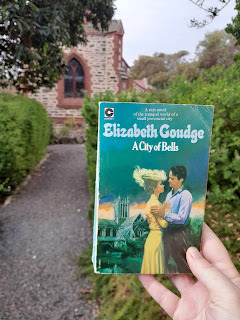
Jocelyn Irvin has just returned from the Boer War with an incurably lamed leg. He heads for the cathedral town or Torminster, where he recovers his love of life in the invigorating company of his cousin, Hugh Anthony, his grandfather, the Canon and Henrietta.
When Jocelyn moved into the little house where Ferranti once had lived, a dark Byronic spirit haunted its rooms. Was Ferranti alive or dead? Until they knew, Jocelyn and Felicity must reach out to him. Until Ferranti no longer needed them, they must yield slowly to the madness of love. So the ghost of Gabriel Ferranti guided their lives in surprising ways, and more than one bewildered heart was restored to the wonder and magic of living.
MY THOUGHTS:
This is one of my favourite Goudge novels so far. It was published in 1936 but set even earlier, around the turn of the 20th century.
Jocelyn Irvin is a disconsolate young Boer War vet who's been wounded in combat and wonders what he now has to offer the world. When he goes to stay with his grandparents in the Cathedral town of Torminster, big surprises unfold. Jocelyn is coerced to rent an abandoned premise on the High Street and start a bookshop.
Next, he discovers some intriguing snippets of verse and marginalia by the former resident, a down-and-out poet named Gabriel Ferranti, who has disappeared. When Jocelyn decides on a whim to fill in the gaps and finish Ferranti's project, he has no idea how it's destined to take shape.
Meanwhile, Jocelyn is often followed around by two polar opposite kids; his inquisitive cousin Hugh Anthony who is always demanding to know the 'whys' of everything, and the dreamy, contemplative adoptee, Henrietta, who is a bit of a nature mystic. Their childhood antics comprise the second main thread of the book.
I like Jocelyn's predicament, as he embodies the optimistic theme that life may still hold lots in store for someone who is burned-out. Sometimes destiny takes a bit of arm-twisting from others. Felicity, his future love interest, and Henrietta, who'd both only just met him, shed bitter tears to think that he might refuse to open the bookshop. The sensible part of me says, 'Gee whiz, girls, a bloke doesn't have to open a bookshop if he doesn't want to,' while my romantic, Goudge-inspired soul urges, 'Come on mate, you'd better just cave in and do it.'
Being an early 20th century novel, we come up close and personal with some outdated attitudes, especially from 'Grandmother.' Here's her attitude when Jocelyn decides to start the shop after all.
'Every time she bought a leg of mutton from Mr Atkins the butcher, she would be obliged to remember that her own grandson was a colleague of Mr Atkins, and Mr Atkins would probably remember it too and the mutton would be tough in consequence. And every time she bought a spool of cotton from Mr Bell the draper, she would remember that just behind her across the marketplace, Jocelyn was selling Eric or Little by Little to Canon Elphinstone for Canon Elphinstone's grandson's birthday present... The same wooden counter separating her from Mr Bell, emphasising the gulf between them, would be separating Canon Elphinstone from her own grandson. And Canon Elphinstone, whose blood people said was not nearly so blue as he gave one to understand, would be very patronising about it.'
Whew, what can you do about snobbery like that? Sorry to any retail workers.
Elizabeth Goudge wields a magic pen, same as her characters Ferranti and Jocelyn. I'm surprised I loved this novel as much as I did, because it's riddled with tedious tropes and stereotypes. Ferranti is the typical depressed and tortured artist who's his own worst enemy, and the discovery of little Henrietta's parentage is predictable and dare I say corny. Honestly, Goudge would have been far less slick and more true to life had she allowed Henrietta's background to remain a mystery. But she's forced similar startling coincidences in some of her other novels (for example, the revelation of Stella's parents in Gentian Hill.)
Even though Goudge recycles her own plot points in the most heavy-handed way, this book is great! Perhaps she performs a similar sort of 'thought transference' on her readers with which she credits Ferranti and Jocelyn, because its beauty and old world charm make me happy, just as I'm sure Goudge intended. It's a joy to see these inhabitants of Torminster observing every ancient church celebration with the vigilance they deserve. She puts the holiness back into holiday. This lifestyle clearly added colour and variety to each year, and no doubt we're poorer for the lack of sanctified rituals in the 21st century.
I enjoyed it enough to try to get hold of a copy of its rare, out-of-print sequel, Henrietta's House (review coming soon).
🌟🌟🌟🌟½
May 29, 2024
'Farmer Boy Goes West' by Heather Williams
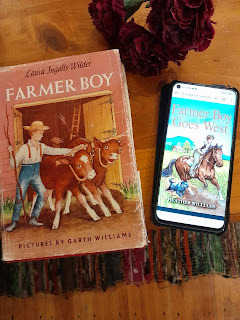
MY THOUGHTS:
Woohoo, this lovely sequel to Farmer Boy was first published back in 2012 and I only recently found about it. Seeing its cover and blurb pop up on the internet transported me back to a day in my school library when I first discovered the original Farmer Boy. I was about 11 and I'd read the Little House series through to These Happy Golden Years but had no idea Laura had written a book about Almanzo's childhood. All these years later, the delight of discovery was exactly the same. I found an online copy of Farmer Boy Goes West from Internet Archive to borrow and got stuck straight into it.
This story takes Almanzo through his mid teens. His parents decide to travel west to visit Uncle George and Aunt Martha at Spring Valley, Minnesota, with a view to settling down there. Royal and Eliza Jane agree to stay home at Malone and mind the farm, but Alice and Almanzo are privileged to experience the new vistas. They also have Perley, the surprise baby brother who was born 12 years after Almanzo.
Williams' portrayal of Almanzo is consistent with the modest, compassionate and courteous boy we already know him to be. His two great passions, horses and food, still take top place, but he also develops his first crush on a girl, the beautiful Catherine, who is a fictional foil to Laura. Catherine highly values her own traditional beauty, isn't intellectually bright, and hates horses. Williams writes in her Afterword that she loves Almanzo, and adds, 'But who doesn't?' Indeed, he's pretty unique in literature. He never shared the writing ambitions of his wife and daughter, yet achieved vicarious fame simply for being his tranquil, hard-working self.
I love James and Angeline, the Wilder parents, just as I did in Farmer Boy. She's still one of my great role models for running a household with grace and panache. Almanzo's favourite sister, Alice, is her sweet, smart self, sharing a great rapport with him. In this novel, her future husband, Albert Baldwin, is introduced as a fellow, spirited school student.
Poor Eliza Jane still gets a poor profile, which I can't help wondering at this stage is more traditional than deserved. Whenever Royal is in the picture, he delivers some excellent lines. And we meet the witty cousin Willy Wilder, who lived in India with his parents for a period of time. Holding it all together, of course, is the admirable teenager Almanzo, whose headspace is ideal to view all the others from.
The story begins when he's almost 14, and by the end he's nudging 16, which is getting far closer to that brave19-year-old we meet in De Smet, who decides to dash between the blizzards for the life-saving wheat. Heather Williams has filled in the great time gap which was left by Laura Ingalls Wilder between Farmer Boy and The Long Winter which is a fantastic favour for all of us Little House fans.
She's done all the research and clearly knows Laura's stories well. I like it when James and Angeline discuss whether or not to relocate. She says, 'Better to be safe than sorry,' to which he responds, 'Be sure you're right, then go ahead.' Remember that feed store scene from The Long Winter, when Almanzo and Royal throw those very same lines at each other, drawing from their parents' favourite catchlines? Brilliant, subtle nod to canon.
I love everything about this book, but I think my favourite chapters are about the basket social, highlighting Almanzo's gentlemanly nature. What awkward fun.
🌟🌟🌟🌟🌟
The Vince Review
I invite you to treat this blog like a book-finder. People often ask the question, "What should I read next?" I've done it myself. I try to read widely, so hopefully you will find something that will strike a chord with you. The impressions that good books make deserve to be shared.
I read contemporary, historical and fantasy genres. You'll find plenty of Christian books, but also some good ones from the wider market. I also read a bit of non-fiction to fill that gap between fiction, when I don't want to get straight on with a new story as the characters of the last are still playing so vividly in my head. ...more
- Paula Vince's profile
- 108 followers



